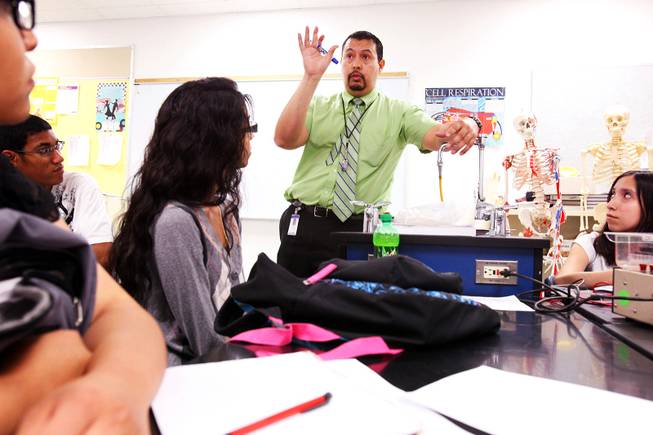
Science teacher Sergio Lopez leads a science proficiency exam tutoring session for seniors at Chaparral High School in Las Vegas on Monday, April 23, 2012.
Tuesday, April 11, 2017 | 2 a.m.
Teacher evaluations are the focus of three bills at the Legislature, with one measure looking to eliminate student test scores from the process completely.
The measures came up before Assembly education committee members Monday. One bill eliminates student test scores from the evaluation process, another includes only local assessments, and a third gives a scoring boost to teachers in crowded classrooms.
Assemblyman Ozzie Fumo, D-Las Vegas, told committee members that he sponsored Assembly Bill 212 to completely remove student test scores in response to teachers who said the system evaluates them based on students they may not even teach. He acknowledged the challenges his bill faces with current political realities.
Charter school representatives spoke against a possible amendment to Fumo’s bill that would include this particular type of public school in the process. They said charter schools can be shut down for lack of efficacy.
“One of the fundamental tenets of charter schooling is greater autonomy for greater accountability,” said Kerrie Kramer of the Charter School Association of Nevada.
Fumo said the system as it stands now is fundamentally unfair to students and teachers.
“It speaks volumes that when the amendment came out, the charter schools were the first one to run to the table and say, ‘Don’t include us in this mess,’” Fumo said. “Because what we have right now is a mess.”
Lawmakers also heard a proposed amendment by the Teachers and Leaders Council for Assembly Bill 320, a measure sponsored by Assemblyman Jason Frierson, D-Las Vegas, that takes statewide evaluations out of the equation in favor of 20 percent local assessments as determined by principals and teachers. The bill also allows teachers who score “highly effective” two years in a row to be exempt from a couple rounds of evaluations, with their high rating standing until their next assessment.
Educators who spoke in favor of nixing test scores or replacing them with localized assessments talked about the difficulty of applying the current system in districts with highly transient student populations and low-income families. Some said science and special education teachers, among others, were being evaluated based on test scores outside their subject areas.
Nevada Superintendent of Public Instruction Steve Canavero spoke against all three bills, saying student performance is an important aspect of evaluating outcomes.
“It is premature to make changes to the teacher evaluation system because it has not yet been fully implemented,” he said.
Canavero said the Legislature adopted the evaluation system in 2011 and then changed it in both 2013 and 2015.
Assemblywoman Brittney Miller, D-Las Vegas, said she sponsored Assembly Bill 312 to give teachers in larger classrooms automatic top scores in certain areas of evaluation, such as parent contacts.
Teachers in support of the measure said this makes sense when teachers with 25 students will be able to contact more parents in less time than educators with 30 to upward of 40 kids in their classrooms.
Canavero and others said there are ways to help teachers with large class sizes without using the evaluation system.
Miller said she’ll continue to work with stakeholders on the bill, while work also continues on Frierson's and Fumo’s bills.

Join the Discussion:
Check this out for a full explanation of our conversion to the LiveFyre commenting system and instructions on how to sign up for an account.
Full comments policy